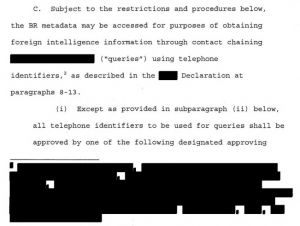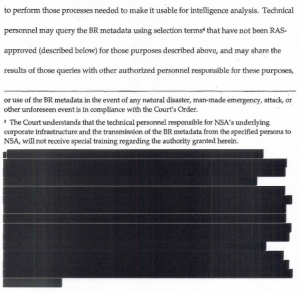The Phone Dragnet Adopted “Selection Term” by 2013
As I laid out last week, I’m not convinced the term “specific selection term” is sufficiently narrowly defined to impose adequate limits to the “reformed” Section 215 (and NSL and PRTT) programs. Here’s how the House defined it:
SPECIFIC SELECTION TERM.—The term ‘specific selection term’ means a term used to uniquely describe a person, entity, or account.
That said, as I also noted, the motion to amend January’s primary order used the term to refer to the query term, which may suggest my concerns are unfounded.
I’ve looked further, and the amendment’s use of the term was not new in the phone dragnet.
In fact, the phrase used to refer to the query subject changed over the course of the dragnet. The first Primary Order authorized the search on “particular known phone numbers.” That usage continued until 2008, when Primary Order BR 08-08 introduced the term “particular known identifier.” A completely redacted footnote seems to have defined the term (and always has). Significantly, that was the first Primary Order after an August 20, 2008 opinion authorized some “specific intelligence method in the conduct of queries (term “searches”) of telephony metadata or call detail records obtained pursuant to the FISC’s orders under the BR FISA program.” I think it highly likely that opinion authorized the use of correlations between different identifiers believed to be associated with the same person.
The September 3, 2009 Primary Order — the first one resuming some normality after the problems identified in 2009 — references a description of identifier in a declaration. And the redaction provides hints that the footnote describing the term lists several things that are included (though the footnote appears to be roughly the same size as others describing identifier).
The Primary Orders revert back to the same footnote in all the orders that have been released (the government is still withholding 3 known Primary Orders from 2009). And that continued until at least June 22, 2011, the last Primary Order covered by the ACLU and EFF FOIAs.
But then in the first Primary Order after the 2011-2012 break (and all Primary Orders since), the language changes to “selection term,” which like its predecessor has a footnote apparently explaining the term — though the footnote is twice as long. Here’s what it looks like in the April 25, 2013 Primary Order:
The change in language is made not just to the subject of queries. There’s a paragraph in Primary Orders approving the use of individual FISA warrant targets for querying (see this post for an explanation) that reads,
[Identifiers/selection terms] that are currently the subject of electronic surveillance authorized by the Foreign Intelligence Surveillance Court (FISC) based on the FISC’s finding of probable cause to believe that they are used by agents of [redacted] including those used by U.S. persons, may be deemed approved for querying for the period of FISC-authorized electronic surveillance without review and approval by a designated approving official.
The change appears there too. That’s significant because it suggests a use that would be tied to targets about whom much more would be known, and in usages that would be primarily email addresses or other Internet identifiers, rather than just phone-based ones. I think that reflects a broader notion of correlation (and undermines the claim that a selection term is “unique,” as it would tie the use of an identity authorized for Internet surveillance to a telephone metadata identifier used to query the dragnet).
Finally, the timing. While the big gap in released Primary Orders prevents us from figuring out when the NSA changed from “identifier” to “selection term,” it happened during the same time period when the automated query process was approved.
This may all seem like a really minor nit to pick.
But even after the language was changed to “selection term” on Primary Orders, top intelligence officials continued to use the term “identifier” to describe the process (see the PCLOB hearing on Section 215, for example). The common usage, it seems, remains “identifier,” though there must be some legal reason the NSA and DOJ use “selection term” with the FISC.
It also means there’s some meaning for selection term the FISA Court has already bought off on. It’s a description that takes 15 lines to explain, one the government maintains is still classified.
And we’re building an entire bill off a vague 17-word definition without first learning what that 15-line description entails.




The Bush administration built a case for war on 16 words, and now you’re telling me that the Obama administration claims to be fighting one built on 17 words?
Lovely.
But you’re absolutely right about the shift from “identifier” to “selection term” as being significant. The fact that it came at the same time as the automated query process was approved suggests to me that they borrowed the language from computer jargon, but would not have done so without some serious legal reasons as well.
For what it’s worth, I don’t think this is a nit, let alone a minor one.
If we’re writing laws about search queries, we really ought to have a clear definition of what it is we’re writing laws about. That seems basic, albeit in the current environment, apparently naively utopian.
Bruce Schneier has made the point that we’re watching a tipping point where, for various classes of data, searching is becoming cheaper than sorting. We’re no longer building dossiers on people, we’re collecting everything and searching it. If we were writing laws about dossiers, we’d be very clear about whom we’d allow dossiers to be built. We need to be that clear about search terms.
Snowden’s act has exposed sociopolitical contradictions on many levels. When committed civil libertarians support USA FREEDOM, does it expose the limits of their activism? Isn’t it better to stand on principle? Civil libertarians can say clearly, this ‘reform’ is inadequate and duplicitous, and demand a new Church committee and full, public technical solutions in law. If America is not big enough to deal honestly with Edward Snowden and the many urgent global issues implicated by his act, the liberation tech community and foreign publics are.